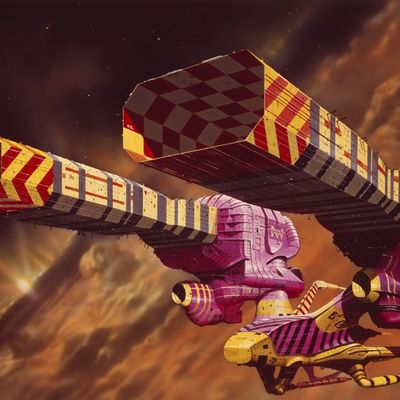
We like to think of movies that never get made, or that were left unfinished, as tragedies. Think back to the documentary Lost in La Mancha, a funny yet ultimately dispiriting look at Terry Gilliam’s strangely cursed attempt to film The Man Who Killed Don Quixote; Gilliam is still trying to make that movie. But when director Frank Pavich entertainingly traces the story of another unmade movie in the doc Jodorowsky’s Dune, he finds something surprising: a happy ending. Sort of.
Could Alejandro Jodorowsky’s film version of Dune ever have actually happened? Who knows? In the mid-1970s, on the heels of his cult hits El Topo and The Holy Mountain, the Chilean-born director planned to film Frank Herbert’s dense, immense sci-fi magnum opus. The movie he envisioned, several years before Star Wars, was sprawling, dreamlike, and a little insane, with state-of-the art special effects, tracking shots that journeyed through entire galaxies, a robot Salvador Dali, and a naked, floating Orson Welles. It would run for hours and hours, with Pink Floyd doing the music and Mick Jagger playing the bad guy. To assist him in this effort, Jodorowsky hired people like Dan O’Bannon, H.R. Giger, and the comic book artist Jean “Mobius” Giraud – who would all go on to become sci-fi royalty. His producer on the project was oil heir Michel Seydoux, himself later to become one of Europe’s biggest producers.
The movie never happened, of course, and Pavich shows that Jodorowsky is still angry about the whole thing; when, late in the film, the ordinarily laid-back and avuncular director holds up a wad of money and starts to spit fire at the business-oriented mindset that scuttled his efforts, he looks like he could kill somebody. But the doc also suggests that the director’s Dune project, in death, became more powerful than it ever might have in life – a blood sacrifice to the movie gods that allowed it to be reborn in other movies and media. (It’s certainly more influential than the Dune movie that did get made, David Lynch’s 1985 disaster.) Pavich finds elements of Jodorowsky’s plan in Alien, Flash Gordon, Star Wars, Contact, and The Terminator, among others. It also manifested itself in The Incal, the comic books that Jodorowsky and Moebius created out of some of their concept art for the aborted film. (It’s not mentioned here, but his Dune also found its way into Luc Besson’s The Fifth Element, which actually once prompted a lawsuit from Jodorowsky.)
It may strike some as odd that such a wonderfully deranged movie project gets such a straightforward documentary: Pavich lovingly animates some of Jodorowsky and Moebius’s storyboards, but for the most part, he’s dealing here with lots of talking heads, both the folks who were originally involved and others who chime in on the what-might-have-beens surrounding the legendary non-movie. Should Jodorowsky’s Dune have been more stylized, or loonier, to better live up to the ambitious experimentalism of the Dune dream? I’m not sure. Pavich wants to bear witness more than he wants to recreate, or reimagine. In that sense, the sober approach works well, because it speaks to the director’s own wonder at what he’s discovering: This almost happened, he seems to be saying. This crazy movie actually came that close to getting made.
Pavich is clearly in awe of Jodorowsky (who wouldn’t be?), but he still treads a fine line between buying the director’s notions of a spiritual quest at face value and soberly detailing said journey’s particulars. In one archival interview, the late effects artist and screenwriter O’Bannon relates how Jodorowsky literally gave him a perfectly timed hallucination of what he wanted to see in the film through the use of some “very special marijuana.” Pavich playfully represents a half-animated version of the encounter, showing psychedelic beams of light emanating from a smiling Jodorowsky’s head. The moment both underlines the silliness of the anecdote but also makes you imagine what it might have actually been like. Similarly, the fortuitous circumstances whereby Jodorowsky assembled his creative team and cast also seems pseudo-mythological. Did he really run into the obscure Moebius right in his own manager’s office, after wondering how on earth he was ever going to find this guy? Did Mick Jagger really wander up to him at a party, as if in a trance? Who cares? They’re great stories, and it’s through them that Jodorowsky’s Dune shows us how the greatest movie never made, in its own crazy little way, somehow still came to be.


